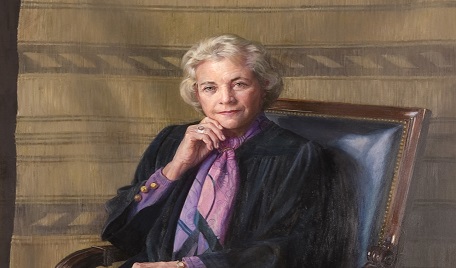 The late Justice Sandra Day O’Connor played a key role in some of the Supreme Court’s major decisions during her nearly 25 years on the bench. Here is a look at several of those cases involving the first woman to serve on the Court, including decisions about the First Amendment, the Fifth Amendment, affirmative action, abortion, and the 10th Amendment.
The late Justice Sandra Day O’Connor played a key role in some of the Supreme Court’s major decisions during her nearly 25 years on the bench. Here is a look at several of those cases involving the first woman to serve on the Court, including decisions about the First Amendment, the Fifth Amendment, affirmative action, abortion, and the 10th Amendment.
County of Allegheny v. American Civil Liberties Union (1989)
In this case, decided together with two other cases, Chabad v. ACLU and City of Pittsburgh v. ACLU of Greater Pittsburgh, a 5-4 majority ruled that a holiday display inside a courthouse featuring only a nativity scene was unconstitutional, while a 6-3 majority said an outdoor display with a Chanukah menorah and Christmas Tree was permissible. Justice O’Connor said in her concurrence that “[e]very government practice must be judged in its unique circumstances to determine whether it constitutes an endorsement or disapproval of religion.”
Planned Parenthood v. Casey (1992)
In a 5-4 ruling, a divided court upheld Roe v. Wade (1973), and Justice O’Connor, along with Justices Anthony Kennedy and David Souter, wrote the joint controlling opinion about abortion rights. “After considering the fundamental constitutional questions resolved by Roe, principles of institutional integrity, and the rule of stare decisis, we are led to conclude this: the essential holding of Roe v. Wade should be retained and once again reaffirmed,” the three justices wrote. The decision in Dobbs v. Jackson Women’s Health Organization (2022) overturned Planned Parenthood v. Casey.
New York v. United States (1992)
Justice O’Connor wrote the 6-3 majority opinion in a case about the respective roles of the federal government and the states under the 10th Amendment. New York state objected to a federal law that required it to regulate radioactive waste management under the federal government’s direction. “While Congress has substantial power under the Constitution to encourage the States to provide for the disposal of the radioactive waste generated within their borders, the Constitution does not confer upon Congress the ability simply to compel the States to do so,” O’Connor concluded.
Bush v Gore (2000)
Justice O’Connor was one of five justices who denied a request for a recount in the 2000 presidential election. In the per curiam opinion of the Court, the Justices said time limits set by federal law did not allow Florida to complete a recount in the presidential election in a constitutionally valid way. Justice O’Connor did not sign on to a concurrence in the case, but her vote denying the request, along with Justice Anthony Kennedy’s, were crucial in the outcome.
Grutter v. Bollinger (2003)
In another 5-4 decision, Justice O’Connor wrote the majority opinion in this landmark case about affirmative action. The majority upheld the University of Michigan Law School’s policy of racial preferences in student admissions. O’Connor said the policy met “a compelling interest in obtaining the educational benefits that flow from a diverse student body” and did not conflict with the 14th Amendment.
Virginia v. Black (2003)
In this case, three men contested a Virginia law that made burning a cross a crime on its own, without unmistakable evidence that the act was made to intimidate people. In her majority opinion, Justice O’Connor wrote that “while a State, consistent with the First Amendment, may ban cross burning carried out with the intent to intimidate, the provision in the Virginia statute treating any cross burning as prima facie evidence of intent to intimidate renders the statute unconstitutional in its current form.”
Lawrence v. Texas (2003)
Justice Anthony Kennedy wrote the 6-3 majority opinion in this landmark case, which held a Texas law making it a crime for two persons of the same sex to engage in sexual conduct violated the 14th Amendment’s Due Process Clause. O’Connor, joining the majority, wrote a separate concurrence to say that the 14th Amendment’s Equal Protection Clause also came into play. “A law branding one class of persons as criminal solely based on the State’s moral disapproval of that class and the conduct associated with that class runs contrary to the values of the Constitution and the Equal Protection Clause,” she wrote.
Hamdi v. Rumsfeld (2004)
Justice O’Connor wrote the plurality decision in the case of Yaser Hamdi, an American citizen detained as an enemy combatant during a conflict with the Taliban in 2001. O’Connor wrote that although Congress permitted the detention of combatants in narrow circumstances, in Hamdi’s case, his Fifth Amendment due process rights had been violated. The Constitution, she said, “demands that a citizen held in the United States as an enemy combatant be given a meaningful opportunity to contest the factual basis for that detention before a neutral decisionmaker.”
McCreary County v. ACLU of Kentucky (2005)
In this case, the American Civil Liberties Union sued a Kentucky county after it posted three versions of the 10 Commandments in courthouses and public schools. Justice David Souter wrote the 5-4 majority opinion. In her concurrence, O’Connor again stated her belief in a test that sought to prevent the government’s support of one religion over another. “The purpose behind the counties’ display is relevant because it conveys an unmistakable message of endorsement to the reasonable observer,” she wrote.
Related Content
Supreme Court Online Exhibition: Sandra Day O’Connor: First Woman on the Supreme Court
National Constitution Center: America’s relic: The story of the Lincoln catafalque
National Constitution Center: Retired Associate Justice Sandra Day O’Connor passes away at 93







